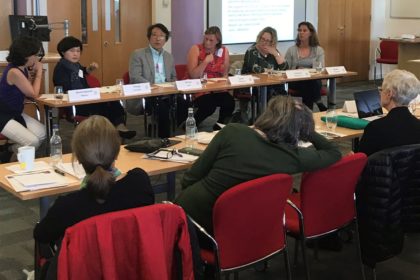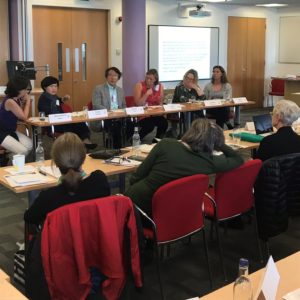
2019 Care Work and the Economy Annual Meeting in Glasgow, Scotland
 The Care Work and the Economy (CWE-GAM) held its 2nd Annual Meeting in Glasgow, Scotland on June 30-July 2, 2019. The network of 50 researchers and stakeholders convened to discuss the project’s progress since its 2018 Annual Meeting in Berlin. The Co-Principal Investigators Maria Floro and Elizabeth King commenced the meeting by introducing the different working groups of the project and highlighting some of the project’s outputs so far. Program Officers from the sponsors The William and Flora Hewlett Foundation and Open Society Foundations related their support for research on care work and its link to engendering policy and advocacy work. Find the full meeting agenda here and a summary of the meeting below.
The Care Work and the Economy (CWE-GAM) held its 2nd Annual Meeting in Glasgow, Scotland on June 30-July 2, 2019. The network of 50 researchers and stakeholders convened to discuss the project’s progress since its 2018 Annual Meeting in Berlin. The Co-Principal Investigators Maria Floro and Elizabeth King commenced the meeting by introducing the different working groups of the project and highlighting some of the project’s outputs so far. Program Officers from the sponsors The William and Flora Hewlett Foundation and Open Society Foundations related their support for research on care work and its link to engendering policy and advocacy work. Find the full meeting agenda here and a summary of the meeting below.
Rethinking Macroeconomics (Working Group 1)
The first day of the conference was devoted to discussing theoretical papers incorporating care into macroeconomic frameworks. Elissa Braunstein, Professor of Economics at Colorado State University, recapped the papers produced in the first year:
- “Microfinance and the Care Economy” by Ramaa Vasudevan and Srinivas Raghavendran
- “Access to Infrastructure, Women’s Time Allocation, and Economic Growth” by Pierre-Richard Agénor and Madina Agénor
- “Gendering Macroeconomic Analysis and Development Policy: A Theoretical Model for Gender Equitable Development” by Özlem Onaran, Cem Oyvat, and Eurydice Fotopoulou
- “Endogenous Growth, Population Dynamics, and Returns to Scale: Long-Run Macroeconomics when Demography Matters” by James Heintz and Nancy Folbre
- “Estimating the Role of Social Reproduction in Economic Growth” by Elissa Braunstein, Stephanie Seguino, and Levi Altringer
These 5 papers can be accessed in full here.
Five additional papers were presented at the meeting followed by active discussion and feedback:
- “The Unequal Distribution of Care Work and the Macroeconomy” by Ignacio Garcia González, Lídia Brun, Maria Floro, and Bong Sun Seo
- “Long-Term Care and Family Power Dynamics” by Ray Miller and Neha Bairoliya
- “Policy Analysis in a Macroeconomic Model of Social Reproduction” by Elissa Braunstein and Daniele Tavani
- “Impact of Policy Interventions at Reduction and Redistribution of Unpaid Care Work on Employment Generation, Time- And Income-Poverty and Gender Gaps: A Macro-Micro Policy Simulation For Turkey” by Ipek Ilkkaracan, Kijong Kim, Tom Masterson, Emel Memis, and Ajit Zacharias
- “The Effect of Gender Equality and Fiscal Policy on Growth and Employment: The Case of South Korea” by Cem Oyvat and Özlem Onaran
After each paper discussion, Braunstein led a general discussion on the persistent gaps in gender-aware macro models and the critical aspects of care incorporated in them. The attendees raised several dimensions of care including quality, its effect on labor productivity, the role of technology, its intersection with migration, and the distinction between publicly and privately provided care services. The importance of making underlying assumptions and modeling decisions transparent and the relevance of such models in other settings and institutional environments were discussed as well.
Understanding and Valuing Care (Working Group 2)
Group 2 started the second day of the meeting with the presentation of their work on accounting for and understanding care work in South Korea. Jooyeoun Suh presented the methodologies for measuring the paid and unpaid care sectors using various national datasets. Gretchen Donehower presented the methodology for projecting care demand and supply to 2030.
To understand the nature of care work in South Korea, Ito Peng gave an overview of care policies and the status of care workers. Eunhye Kang presented findings on the various care arrangements and the nature of caregiving activities for young children and frail elderly using the newly collected Care Work Family Survey data. The next presentation focused on measuring and understanding the strain of caregiving. Ito Peng introduced a multidimensional measure of caregiving strain. Hyuna Moon shared findings from her qualitative fieldwork on unpaid caregivers’ eldercare responsibilities and work burdens. Seung-Eun Cha showed how the unpaid caregivers’ desired and actual time spent on eldercare differed using the Care Work Family Survey.
Following the presentations, the meeting attendees engaged in discussion on how to define paid care work, the importance of distinguishing between public and private care services, and how much of the experience in and lessons from South Korea are generalizable to other countries.
Gender Aware Applied Modelling (Working Group 3)
Group 3 provided an update of the Computable General Equilibrium (CGE) models incorporating care. Marzia Fontana and Carmen Estrades provided a literature review of applied models of gender-equitable macroeconomic policies and noted the potential contribution of CGE models. Hans Lofgren presented a gendered Social Accounting Matrix (SAM) for a CGE model in South Korea and suggested relevant policy simulations. A lively discussion ensued regarding how best to incorporate in the model social norms, migration, the relationship between care and human capital formation, and the public and private forms of care provision. Participants also shared ideas on how to present the CGE model in a convincing way to Korean policymakers such as engaging with Korean CGE modelers, validating the SAM with Statistics Korea and Korean researchers, and conducting robustness checks.
Roundtable Discussions
Elizabeth King moderated a roundtable discussion on the current and future demand for care and its implications for the economy. The issue of care is front and center due to rapidly changing demographics around the world; at the same time the types of care demand need to be carefully considered as they can differ across countries. Distinguished panelists discussed the different demands for care, which can vary by development stage, the importance of good data on care, and the search for an optimal mix or combination of family, market and public care provision.
Shahra Razavi moderated a second roundtable discussion that brought together a diverse group of academic researchers, policymakers and activists in Scotland and South Korea. The panel discussed the current situations of public care provisioning, the working conditions of paid and unpaid caregivers, and the challenges that stakeholders face in both countries. While Scotland and South Korea have taken formal measures to increase the role of government in care provision and to recognize the value of unpaid care at home, the implementation of these measures can be challenging due to social norms, rural-urban divide and problems in recruiting and retaining paid care work force. Research plays an important role in promoting effective, gender-aware care policies and in pushing the agenda for equitable, quality care provisioning.
Application to Other Countries
Participants engaged in group discussions on the possibility of adapting the Care Work and the Economy project in different parts of the world. In Latin America, Colombia and Uruguay were identified as possible countries for adaptation; both countries are at early stages of care policy implementation and have strong research capacity, with interest from advocacy groups. In Africa, the group highlighted the importance of framing the relevance of care within the context of achieving a demographic dividend. There is also need to make a strong case as to why governments should invest in care provisioning; further empirical work is required in order to fully understand the current care delivery system and varied forms of care arrangements. Two countries that can be considered for developing a care and the economy project are Senegal and Uganda. In Asia, Thailand and Mongolia are identified as potential countries for adaptation with both countries heavily relying on families for caregiving and lacking government support for care services.
Going Forward
Representatives of the Project’s three working groups expressed their commitment to collaborate and work together in moving forward with producing the final outputs of the project. Group 1 announced their plans to publish special issues of an academic journal to showcase their papers. In South Korea, Group 2 will host a conference inviting policymakers, advocacy groups and academia in October 2019 and to host a policy dialogue conference with Korean government officials and a training workshop for advocacy groups in 2020. Group 3 will move forward in revising the gendered Social Accounting Matrix based on comments raised at the meeting and in conducting simulations on policies of interest in collaboration with Group 2. Other key recommendations from the meeting participants included improving communication and exchange between working groups so as to produce a coherent set of outputs (papers), clarifying the generalizability of the Korean case study to other countries, and using different communication strategies in order to disseminate the findings.
